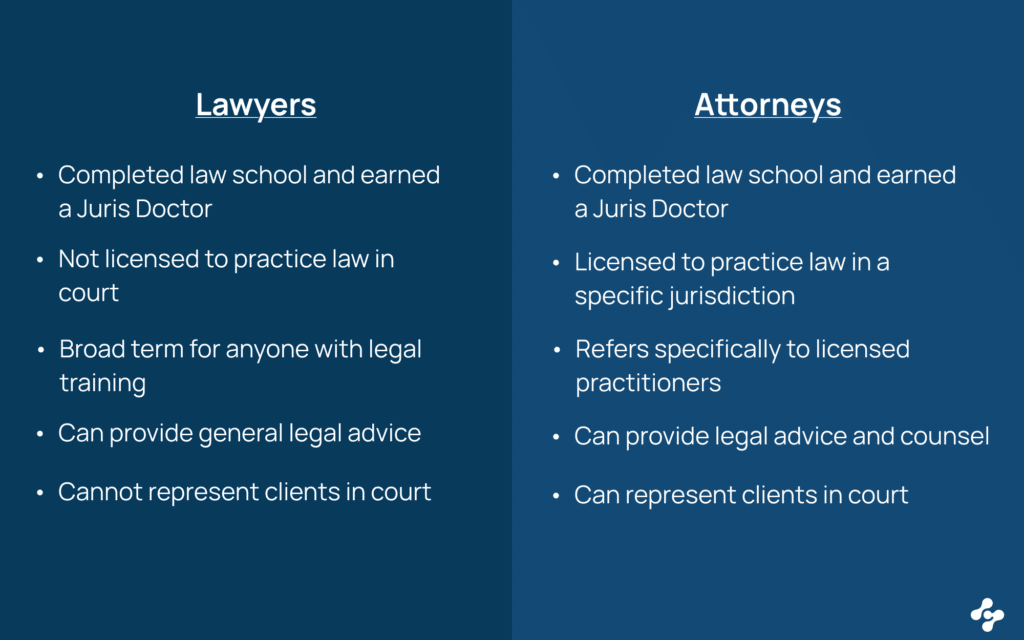If you’ve ever faced a legal issue, you’ve probably wondered: should you call a lawyer or an attorney? The two titles are often used interchangeably in the United States, but they don’t always mean the same thing.
The difference may not be obvious at first, but it can impact who’s qualified to represent you, especially in situations involving personal injury, criminal defense, or probate litigation. Understanding that distinction is an important first step when you need legal advice or help navigating the legal profession.
Contents
What’s the difference between a lawyer and an attorney?
Lawyer: the broad term
A lawyer is someone who has completed law school and earned a law degree, typically a Juris Doctor (JD). Lawyers can provide legal advice, help with legal documents, and assist with legal research.
What lawyers typically handle
Lawyers are well-equipped to help with a variety of tasks outside the courtroom, such as:
- Drafting and reviewing legal documents
- Providing general legal advice
- Conducting legal research
- Teaching or working in policy or government
- Volunteering through legal aid programs or volunteer lawyers
However, not all lawyers have taken the bar exam. That means they may not be authorized to provide legal representation in a courtroom or act as legal counsel in formal proceedings.
Attorney: A lawyer who can represent you
An attorney is a type of lawyer—specifically, one who has passed the bar exam and is licensed to practice law in a specific jurisdiction. Attorneys can represent clients in court, negotiate settlements, and act as your official legal advocate.
What attorneys can handle
Attorneys handle more complex or formal legal tasks that require court appearances or negotiations. For example:
- Representing a client in a personal injury case
- Filing motions and appearing before a judge in probate court
- Providing legal counsel in a criminal defense case
- Helping interested parties resolve disputes in probate litigation
- Acting as a labor attorney in workplace disputes
- Advocating for individuals in EDD hearings
- Defending clients facing sex offender registry issues
In each case, an attorney can represent the client in court and serve as a direct legal advocate.
So, the key difference is this:
All attorneys are lawyers, but not all lawyers are attorneys.
Why people might confuse the terms: lawyer vs attorney
Despite the clear key difference, people often use the terms “lawyer” and “attorney” as if they’re interchangeable. This confusion isn’t just common—it’s understandable. Here’s why:
1. Shared legal background
Both lawyers and attorneys attend law school, earn a law degree (typically a Juris Doctor), and study the same foundational topics like constitutional law, contracts, and civil procedure. Because their legal education is identical up until licensure, it’s easy to assume they serve the same function.
2. Overlapping roles in legal practice
Not all legal professionals go to court or represent clients. Some work in legal research, compliance, or advisory roles that don’t require a law license. These individuals are often referred to as lawyers—accurately—but may be mistaken for attorneys because they work in the legal profession and provide legal advice.
3. Inconsistent use by the public and media
In casual conversations, articles, and even legal blogs, people often choose whichever term sounds right at the moment. Someone might call a personal injury attorney a personal injury lawyer, even though one implies court representation and the other doesn’t always guarantee it.
4. Assumed bar passage
Many people assume that graduating from law school means someone has passed the bar exam, but that’s not always true. Some individuals choose not to take the exam—or don’t pass it—but still work in law-related fields. Without checking licensure in a specific jurisdiction, it’s impossible to know whether someone is legally authorized to provide legal representation.
5. Similar job titles across specialties
Titles like probate lawyer, labor attorney, or EDD lawyer are commonly used based on area of practice rather than licensing status. In most cases, if someone is handling court filings or negotiations with an insurance company, they’re an attorney. But the public may still refer to them as a lawyer out of habit.

Why the lawyer vs. Attorney distinction matters
Across the profession, titles carry more weight than you might think. Whether you’re part of a law firm, an administrative team, or a software provider supporting legal professionals, understanding the difference between a lawyer and an attorney helps streamline workflows and maintain clarity across jurisdictions.
Court representation isn’t always optional
In a personal injury claim, court representation is often required. That means the person representing the client must be a licensed attorney—someone who has passed the bar exam in their specific jurisdiction.
Client expectations depend on clarity
When clients seek legal advice, they expect someone who can guide them through negotiations with an insurance company, file motions, or represent them at trial. Referring them to a lawyer who hasn’t passed the bar exam can lead to disappointment, loss of trust, and potential legal exposure for the firm.
Legal compliance and ethics
Using precise terms isn’t just helpful—it’s sometimes required. Misidentifying professionals in legal documents, intake forms, or marketing materials can raise ethical concerns, particularly when dealing with registration fees, contingent fee structures, or regulated legal representation practices.
In short, the terminology matters not just for accuracy—but for delivering a better, more compliant, and effective client experience.
Clarity that supports better case management
Understanding the difference between a lawyer and an attorney goes beyond semantics. In the world of personal injury law, where timing, accuracy, and jurisdiction matter, using the correct terminology helps avoid confusion—for clients, legal teams, and technology providers alike.
Whether you’re identifying who’s authorized to provide legal representation, assigning roles in your law firm, or managing high volumes of personal injury claims, consistent language supports better communication, compliance, and outcomes.
At CloudLex, we build tools for firms that know details matter. From settlement tracking to managing interested parties and court deadlines, our platform is designed to support the demands of personal injury professionals working on behalf of their clients every day.
Need a case management platform built for the modern PI practice? Explore CloudLex and see how we empower attorneys to do what they do best—practice law.

